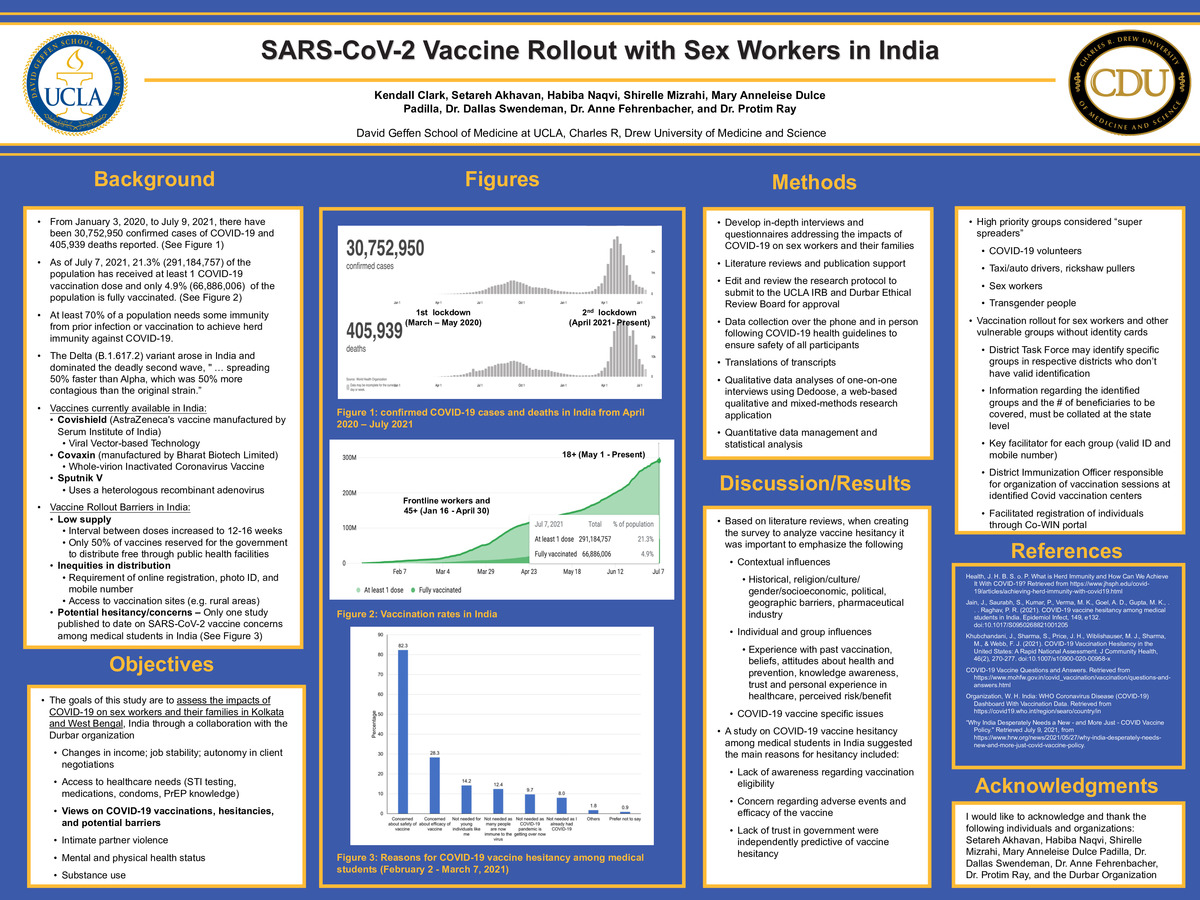-
Author
Kendall Clark -
PI
Dr. Dallas Swendeman
-
Co-Author
Setareh Akhavan, Habiba Naqvi, Shirelle Mizrahi, Mary Anneleise Dulce Padilla, Dr. Dallas Swendeman, Dr. Anne Fehrenbacher, and Dr. Protim Ray
-
Title
SARS-CoV-2 Vaccine Rollout with Sex Workers in India
-
Program
STTP
-
Other Program (if not listed above)
-
Abstract
Background:
From January 3, 2020, to July 9, 2021, there have been 30,752,950 confirmed cases of COVID-19 and 405,939 deaths reported in India. As of July 7, 2021, 21.3% (291,184,757) of the population has received at least one COVID-19 vaccination dose, and only 4.9% (66,886,006) of the population is fully vaccinated. At least 70% of a population needs some immunity from prior infection or vaccination to achieve herd immunity against COVID-19. The Delta (B.1.617.2) variant arose in India and dominated the deadly second wave. Vaccines currently available in India include Covishield (AstraZeneca's vaccine manufactured by Serum Institute of India), Covaxin (manufactured by Bharat Biotech Limited), and Sputnik V. Vaccine rollout barriers in India include a low supply, inequities in distribution, and potential vaccine hesitancy.
Objectives:
The present study aims to assess the impacts of COVID-19 on sex workers and their families in Kolkata and West Bengal, India through a collaboration with the Durbar organization. The project will compare the following before and during the pandemic: income, job stability, and autonomy in client negotiations; access to healthcare needs (STI testing, medications, condoms, PrEP knowledge); views on COVID-19 vaccinations, hesitancies, and potential barriers; intimate partner violence; mental and physical health status; substance use.
Methods:
We developed in-depth interviews and questionnaires addressing the impacts of COVID-19 on sex workers and their families. The research protocol was then edited and reviewed before submitting it to the UCLA IRB and Durbar Ethical Review Board for approval. Data collection will take place over the phone and in person following COVID-19 health guidelines to ensure the safety of all participants. Transcripts will be translated and analyzed. Qualitative data of one-on-one interviews will be analyzed using Dedoose, a web-based qualitative and mixed-methods research application. Quantitative data will be analyzed statistically.
Discussion:
Based on literature reviews, the COVID-19 survey includes questions on contextual influences, individual influences, group influences, and COVID-19 specific issues and their impacts on vaccine hesitancy. In addition, based on a study on vaccine hesitancy among medical students in India, further survey questions were generated regarding beliefs on vaccine efficacy and safety. Vaccination rollout in India has prioritized high-risk groups considered "super spreaders" (COVID-19 volunteers, Taxi/auto drivers, rickshaw pullers, Sex workers, Transgender people). Sex workers are able to receive vaccinations through facilitated registration done by Durbar.
Results:
Pending
-
PDF
-
Zoom
https://uclahs.zoom.us/j/93053931362?pwd=YnBHRTVaOTdzdnFlOEVWSVR1b2V1dz09

